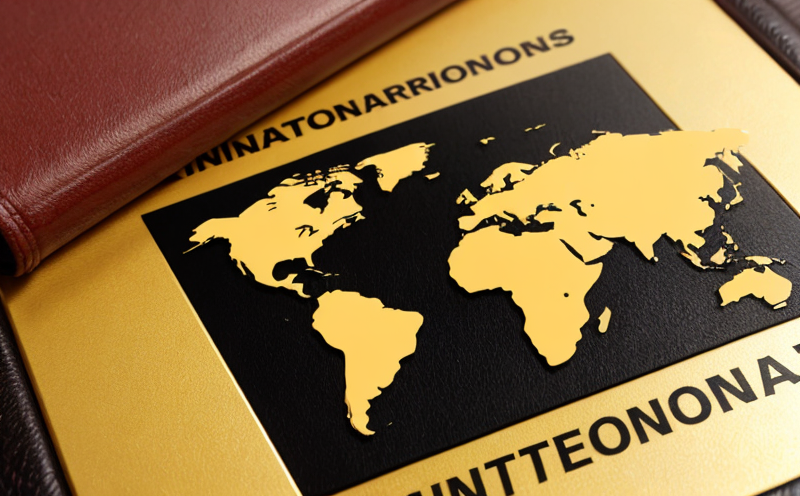International standards and regulations play a crucial role in ensuring consistency and safety across various industries and countries. These standards are developed by international organizations, such as the International Organization for Standardization (ISO) and the International Electrotechnical Commission (IEC), to provide guidelines for products, services, and systems. Compliance with these standards is mandatory for businesses operating globally, as it helps to establish trust, credibility, and market access.
One of the primary reasons why international standards are essential is that they ensure product safety and quality. When a company develops a new product or service, it must adhere to specific guidelines and requirements set by regulatory bodies. These regulations vary depending on the country, industry, and type of product. For instance, food products must comply with international food safety standards, such as HACCP (Hazard Analysis and Critical Control Points) and GMP (Good Manufacturing Practice). Similarly, medical devices must adhere to ISO 13485:2016, which outlines the requirements for a quality management system in the medical device industry.
Another significant advantage of international standards is that they facilitate trade and commerce. When companies operate globally, they often face challenges related to language barriers, cultural differences, and varying regulatory frameworks. International standards help to bridge these gaps by providing a common framework for communication, compliance, and trade. For example, ISO 9001:2015 (Quality Management System) is widely adopted across various industries, ensuring that companies follow similar quality management principles and practices.
Now, lets delve into two specific international standards in bullet point format with explanations:
ISO 27001:2013 - Information Security Management System
This standard outlines the requirements for an information security management system (ISMS) to protect sensitive data from unauthorized access or breaches.
An ISMS is a systematic approach to managing and protecting sensitive information, including customer data, intellectual property, and financial information.
The standard requires organizations to implement policies, procedures, and controls to ensure confidentiality, integrity, and availability of data.
Key aspects of ISO 27001:2013 include:
Risk assessment and management
Security policy and organization
Asset management
Human resources security
Physical and environmental security
ISO 14001:2015 - Environmental Management System
This standard outlines the requirements for an environmental management system (EMS) to identify, assess, and mitigate environmental impacts.
An EMS is a systematic approach to managing and reducing environmental pollution and waste, as well as conserving natural resources.
The standard requires organizations to implement policies, procedures, and controls to ensure compliance with environmental regulations and reduce their ecological footprint.
Key aspects of ISO 14001:2015 include:
Environmental policy
Planning and operational control
Checking and corrective action
Management review
In addition to these standards, regulatory bodies such as the World Trade Organization (WTO), European Union (EU), and the United States Food and Drug Administration (FDA) issue guidelines and regulations for international trade. Understanding and complying with these regulations is crucial for businesses operating globally.
QA Section
Q: What are the benefits of implementing international standards in my business?
A: Implementing international standards can enhance your companys reputation, improve product quality, reduce risks, and increase market access. It also helps to establish trust and credibility among customers, stakeholders, and regulatory bodies.
Q: Which countries require certification to international standards for certain industries?
A: Countries like the United States (FDA), European Union (EU CE marking), Japan (JIS), and China (CCC) require certification to specific international standards in various industries, such as food safety, medical devices, electronics, and machinery.
Q: How do I determine which international standard is relevant to my business?
A: Research your industrys requirements and identify the relevant international standards. You can consult with a certified auditor or a regulatory expert to ensure you comply with all necessary regulations.
Q: What are the main differences between ISO 9001 and ISO 14001?
A: ISO 9001 focuses on quality management, ensuring that products and services meet customer requirements and expectations. In contrast, ISO 14001 emphasizes environmental management, identifying and mitigating environmental impacts to reduce ecological footprints.
Q: Can I use a single certification to meet multiple regulatory requirements?
A: Yes, some certifications can cover multiple regulations or standards. For instance, an ISO 13485 certification for medical devices can also satisfy FDA and EU CE marking requirements.
Q: How often do international standards change, and what are the implications for businesses?
A: International standards are reviewed and updated regularly to reflect emerging trends, technologies, and regulatory changes. Businesses must stay informed about updates and revisions to ensure ongoing compliance and competitiveness.
Q: Can I outsource my auditing or certification process to a third-party organization?
A: Yes, many companies engage external auditors or certification bodies to ensure objectivity and expertise in the auditing and certification process.
Q: What are some common challenges businesses face when implementing international standards?
A: Common challenges include:
Understanding the relevance of specific standards
Lack of resources (time, money, personnel) for implementation
Difficulty in integrating new processes or procedures into existing systems
Balancing regulatory compliance with business goals and objectives
Q: Are there any additional costs associated with implementing international standards?
A: Yes, businesses may incur costs related to auditing, certification, and training to implement international standards. However, the long-term benefits of improved reputation, reduced risks, and increased market access often outweigh these initial investments.
In conclusion, understanding and complying with international standards is essential for businesses operating globally. By implementing these standards, companies can enhance their reputation, improve product quality, reduce risks, and increase market access. Regular review and updates to international standards require ongoing vigilance and adaptation from businesses to remain compliant and competitive in a rapidly changing regulatory landscape.

































